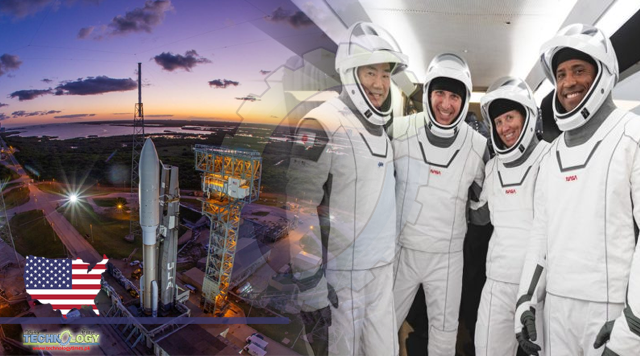Crew-1, the company’s first operational, contracted crewed mission for NASA, will send four astronauts mission to ISS for a six-month stay.

By Mike Wall
Update for 4:20 p.m. EST on Nov. 13: SpaceX’s Crew-1 mission has been delayed to Sunday (Nov. 15) at 7:27 p.m. EST (0027 GMT on Nov. 16).
The planned launch of a U.S. spy satellite this afternoon (Nov. 13) could kick off a binge of four liftoffs in four days, if we’re lucky.
The National Reconnaissance Office’s classified NROL-101 spacecraft is scheduled to launch atop a United Launch Alliance (ULA) Atlas V rocket at 5:13 p.m. EST (2213 GMT) today from Cape Canaveral Air Force Station in Florida. You can watch that mission live here at Space.com, courtesy of ULA, or directly via the company.
Several other rockets will then take to the skies in relatively quick succession, if all goes according to plan. For example, SpaceX is scheduled to launch its Crew-1 mission on Saturday (Nov. 14) at 7:49 p.m. EST (0049 GMT on Nov. 15). Crew-1, the company’s first operational, contracted crewed mission for NASA, will send four astronauts mission to ISS for a six-month stay.
Next up is Rocket Lab, which will loft its “Return to Sender” mission from New Zealand on Sunday (Nov. 15) during a nearly three-hour window that opens at 8:44 p.m. EST (0144 GMT on Nov. 16).
“Return to Sender” will carry 30 satellites to Earth orbit and feature a soft splashdown and recovery of the first stage of Rocket Lab’s Electron booster.
Rounding out the spaceflight quartet will be Arianespace, whose Vega rocket will launch two Earth-studying satellites from French Guiana on Monday (Nov. 16) at 8:52 p.m. EST (0152 GMT on Nov. 17).
And there’s more action just beyond this four-day stretch: SpaceX’s launch of the classified NROL-108 mission for the National Reconnaissance Office could occur as early as Nov. 18, according to Spaceflight Now. Elon Musk’s company also plans to launch the Sentinel 6-Michael Freilich Earth-observation satellite, a joint effort of NASA and several European partners, on Nov. 21.
So get excited, but be prepared for a possible letdown as well: There’s no guarantee that any of these rockets will get off the ground on time, as the scuttling of a similar “launchapalooza” this past August showed.
Originally published at Space.com